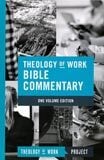When It Comes to Knowing God, Community Matters
Therefore, remember that formerly you who are Gentiles by birth and called “uncircumcised” by those who call themselves “the circumcision” (which is done in the body by human hands)—remember that at that time you were separate from Christ, excluded from citizenship in Israel and foreigners to the covenants of the promise, without hope and without God in the world. But now in Christ Jesus you who once were far away have been brought near by the blood of Christ.
Ephesians 2:11-13
Every recent survey of American religious belief and practice testifies to the fact that Americans are becoming less "religious." We are less apt to attend worship services or join churches. We claim the right to fashion our own beliefs about God, without receiving these as doctrine from a religious community. Time and again, Americans claim to be "spiritual" but not "religious." We assume that our relationship with God (or with the divine or whatever spiritual force we believe in) is something we can and should figure out on our own.
Thus, when we read the Ephesians 2:11-12 in light of our cultural bias, we are apt to disagree with what the text says and with what it assumes. This passage, written to Gentiles, says that they were separate from Christ, excluded from Israel and its covenants, without both hope and God. We might want to ask Paul: How do you know this? How do you know that some of the pre-Christian Gentiles weren't in touch with God even before they accepted God's grace through faith?
In his estimation of Gentile life B.C., Paul makes a couple of crucial assumptions. First, he assumes that the one true God chose to reveal himself to Israel and through Israel to the world. Separation from Israel, therefore, implies separation from God. (Yes, God reveals himself more broadly, through nature, conscience, etc. But natural revelation and general revelation are not adequate for a saving relationship with God. See Romans 1:18-23.)
Second, Paul assumes that God's life is to be experienced in and through the community of God's people. Though we can know God personally as individuals, this knowledge is mediated and nurtured through shared experience of God. God did not reveal himself independently to a dispersed group of individual Jews. Rather, God made himself known to the people of Israel, to whom he revealed his "covenants of promise" and sent his Messiah.
The good news, for those of us who are not Jewish, is that we can truly know God and be included among his people because of what Christ has done for us. We'll learn more about this as we make our way through Ephesians 2. Yet, it's worth noting that the assumptions behind this chapter, as well as its specific teachings, contradict the popular view that we can know God all by ourselves. From the perspective of biblical revelation, true spirituality, though deeply personal, is also deeply corporate. When it comes to knowing God, community matters.
QUESTIONS FOR FURTHER REFLECTION: How do you understand the relationship of community to knowing God? Why do you think so many Americans believe they can (and should) be fully spiritual without being connected to any other people or religious body?
PRAYER: Gracious God, today I pray for those who believe they can be "spiritual" all by themselves. Many are simply caught in the individualism that permeates our culture. I ask that they come to see their need for shared experience with fellow believers.
Others avoid religious communities because they have experienced Christian churches as anything but Christian. They have felt the sting of our judgmentalism. They have smelled the stink of our hypocrisy. They have seen our corporate life as anything but a reflection of the Gospel. For these folk, I pray that they might experience genuine Christian community, so that they might be included among your people. And for your church, I pray that we will repent of our failings even as we seek to be a visible demonstration of the Gospel to the world. Amen.
Image courtesy of Laity Lodge Youth Camp, one of our sister programs in the Foundations for Laity Renewal.






